|
|
|
Sort Order |
|
|
|
Items / Page
|
|
|
|
|
|
|
| Srl | Item |
| 1 |
ID:
171290
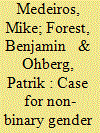

|
|
|
|
|
| Summary/Abstract |
LGBTQ activists and academics advocate the use of non-binary gender categories to include individuals who identify as neither rigidly male nor rigidly female to reflect the increasing number of people who do not place themselves in these two conventional classes. Although some general-population surveys have begun using non-binary gender questions, research has not examined the consequences of using (or not) a question with non-binary gender categories in surveys and censuses. Our study addresses this gap using a survey experiment in which respondents in the United States, Canada, and Sweden randomly received a binary or a non-binary gender question. We find no evidence of negative reactions to the non-binary question. Moreover, when there is a statistical difference, the reactions are positive. We thus conclude that general-population surveys could use a non-binary question without facing significant adverse reactions from respondents.
|
|
|
|
|
|
|
|
|
|
|
|
|
|
|
|
| 2 |
ID:
184199
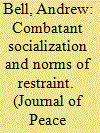

|
|
|
|
|
| Summary/Abstract |
Can armed groups socialize combatants to norms of restraint – in essence, train soldiers to adopt norms of international humanitarian law on the battlefield? How can social scientists accurately measure such socialization? Despite being the central focus of organizational and ideational theories of conflict, studies to date have not engaged in systematic, survey-based examination of this central socialization mechanism theorized to influence military conduct.
This study advances scholarly understanding by providing the first comparative, survey-based examination of combatant socialization to norms of restraint, using surveys and interviews with US Army cadets at the US Military Academy (USMA), Army Reserve Officer Training Corps (ROTC), and active duty Army combatants. Additionally, to better understand ‘restraint’ from combatants’ perspective, this study introduces the concept of the ‘combatant’s trilemma’ under which combatants conceptualize civilian protection as part of a costly trade-off with the values of military advantage and force protection.
Survey results hold both positive and negative implications for socialization to law of war norms: military socialization can shift combatants’ preferences for battlefield conduct. However, intensive norm socialization may be required to shift combatants’ preferences from force protection to civilian protection norms. Study findings hold significant implications for understanding violence against civilians in conflict and for policies to disseminate civilian protection norms in armed groups worldwide.
|
|
|
|
|
|
|
|
|
|
|
|
|
|
|
|
| 3 |
ID:
069733
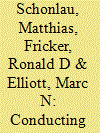

|
|
|
|
|
| Publication |
Santa Monica, Rand Corporation, 2002.
|
| Description |
xxiv, 118p.
|
| Standard Number |
3833031104
|
|
|
|
|
|
|
|
|
|
|
|
Copies: C:1/I:0,R:0,Q:0
Circulation
| Accession# | Call# | Current Location | Status | Policy | Location |
| 045608 | 001.433/SCH 045608 | Main | On Shelf | General | |
|
|
|
|
| 4 |
ID:
088999
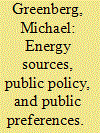

|
|
|
|
|
| Publication |
2009.
|
| Summary/Abstract |
To understand public preferences for energy sources, 2701 US residents were surveyed; 2101 of the respondents lived within 50 miles of a major nuclear facility. Over 90% wanted greater reliance on solar and wind, and over 70% wanted more reliance upon hydroelectric sources. Less than one-third wanted more use of oil and coal. Nuclear and natural gas sources were closer to an even split. Notably, those who lived near nuclear facilities favored the same sources, although a larger proportion of these respondents favored increasing use of nuclear power than in the national sample. These results are consistent with other United States surveys. The study found striking differences in preferences by age, ethnicity/race and other demographic characteristics that need in-depth investigation in order to help decision-makers and everyone else better understand public preferences about energy policy choices.
|
|
|
|
|
|
|
|
|
|
|
|
|
|
|
|
| 5 |
ID:
181642
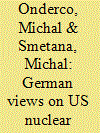

|
|
|
|
|
| Summary/Abstract |
Stationing of US nuclear weapons in Europe is a pillar of NATO deterrence. Despite their growing contestation, scholarly research on contemporary attitudes of both voters and political elites to the continued stationing of these weapons on their soil is lacking. We conducted original surveys of 2020 Germans and of 101 Bundestag members. Our results show scepticism about the military utility of US nuclear weapons in Germany, and aversion towards their use. At the same time, the results show a sizable support among both politicians and citizens for their removal from German territory as part of new nuclear arms control initiatives.
|
|
|
|
|
|
|
|
|
|
|
|
|
|
|
|
| 6 |
ID:
082698
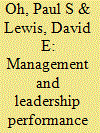

|
|
|
|
|
| Publication |
2008.
|
| Summary/Abstract |
The authors use data from the Federal Human Capital Survey to measure comparative leadership and management performance among executives in the military bureaucracy. The authors evaluate whether differences in executive backgrounds, training, and management environments influence employee evaluations of leadership, management, and work climate. Military service agencies get systematically higher evaluations in leadership and work climate, but not management. Among the services, the Air Force consistently received the highest evaluations. Air Force managers have the highest ranks, the longest military service, and a high level of graduate education when they assume executive positions; these characteristics are positively correlated with performance. Other managerial characteristics associated with high performance were long job tenures and private management experience. The authors conclude that greater attention to graduate training, exploring ways to increase tenure, and the selection of retired officers with private management experience for important executive posts may improve performance
|
|
|
|
|
|
|
|
|
|
|
|
|
|
|
|
| 7 |
ID:
187554
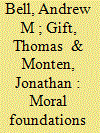

|
|
|
|
|
| Summary/Abstract |
How does partisan identification shape the attitudes of US military officers toward the protection of civilians in war? Drawing on unique cross-cohort surveys of soon-to-be commissioned officers in 12 Army Reserve Officers’ Training Corps (ROTC) training battalions, we find that Democratic-leaning cadets generally prioritize norms of civilian protection more than Republican-leaning cadets when confronted with competing values of military advantage and force protection as part of a ‘combatant’s trilemma’. This gap remains partially resilient after sustained exposure to military training and socialization, including in the norms of restraint embodied by principles of combat ethics and the law of war. We attribute these partisan differences to insights from Moral Foundations Theory (MFT), which suggests that the moral values of Democrats and Republicans guide their views toward the individual use of force in combat. Our findings have important implications for comprehending the impact of political ideology and military training and socialization on attitudes regarding restraint toward civilians in war. Given the widely recognized conservative composition of the US military’s membership, these findings may help to further inform understanding of US military operations and the underlying causes of US adherence to – or violation of – the laws of armed conflict.
|
|
|
|
|
|
|
|
|
|
|
|
|
|
|
|
| 8 |
ID:
152304
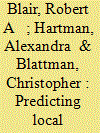

|
|
|
|
|
| Summary/Abstract |
Riots, murders, lynchings, and other forms of local violence are costly to security forces and society at large. Identifying risk factors and forecasting where local violence is most likely to occur should help allocate scarce peacekeeping and policing resources. Most forecasting exercises of this kind rely on structural or event data, but these have many limitations in the poorest and most war-torn states, where the need for prediction is arguably most urgent. We adopt an alternative approach, applying machine learning techniques to original panel survey data from Liberia to predict collective, interpersonal, and extrajudicial violence two years into the future. We first train our models to predict 2010 local violence using 2008 risk factors, then generate forecasts for 2012 before collecting new data. Our models achieve out-of-sample AUCs ranging from 0.65 to 0.74, depending on our specification of the dependent variable. The models also draw our attention to risk factors different from those typically emphasized in studies aimed at causal inference alone. For example, we find that while ethnic heterogeneity and polarization are reliable predictors of local violence, adverse economic shocks are not. Surprisingly, we also find that the risk of local violence is higher rather than lower in communities where minority and majority ethnic groups share power. These counter-intuitive results illustrate the usefulness of prediction for generating new stylized facts for future research to explain. Ours is one of just two attempts to forecast local violence using survey data, and we conclude by discussing how our approach can be replicated and extended as similar datasets proliferate.
|
|
|
|
|
|
|
|
|
|
|
|
|
|
|
|
| 9 |
ID:
163489
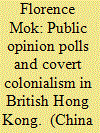

|
|
|
|
|
| Summary/Abstract |
This article examines colonial statecraft and state–society relations in a pivotal period for Hong Kong. Using historical methods and archival evidence, it overcomes the limitations in existing research, which is often theoretically driven and reliant on published sources. The article reveals that the Hong Kong masses were made structurally invisible by the Movement of Opinion Direction (MOOD), a polling exercise introduced by the reformist colonial state. The public were unaware that their views were disseminated to policymakers and that they affected policy formulation: this was covert colonialism. The article investigates confidential MOOD reports generated by the Home Affairs Department from 1975 to 1980, demonstrating why and how the colonial administration constructed public opinion. By disclosing what these secret files reveal about changing public attitudes towards the colonial government, the United Kingdom and the People’s Republic of China (PRC), the article also provides new insights into public receptions of the state’s reforms and potential threats to the colonial regime in the 1970s.
|
|
|
|
|
|
|
|
|
|
|
|
|
|
|
|
| 10 |
ID:
171801
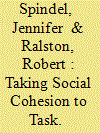

|
|
|
|
|
| Summary/Abstract |
Recent political debates over the inclusion of transgender servicemembers in the US military center around the impact such inclusion will have on unit cohesion and effectiveness. Missing from the debate, however, are the perceptions of those who do the soldiering. What are their perceptions of cohesion? Do they, like political leaders and the general public, believe unit cohesion leads to military effectiveness? In other words, how much does the narrative at the elite level—that insists excluding minority groups is a military necessity—match the perceptions of those who serve? Drawing on an original survey of 151 current and former members of the US military, our results suggest that servicemembers’ perceptions mirror those in the general public: political ideology is correlated with beliefs that minority groups disrupt unit cohesion. We find that conservatives are more likely to believe that the inclusion of transgender soldiers will negatively impact cohesion and undermine unit effectiveness. Moreover, conservatives are more likely to endorse a conceptualization of cohesion that hinges on the social—“people like me” or “band of brothers”—dynamics of cohesion rather than more professional, task-oriented conceptions of cohesion. However, military experience affects these perceptions: respondents with combat experience, who held/hold a higher rank, and who are currently serving are more likely to endorse a task-based conception of cohesion that ties cohesion to professionalism and competence, rather than social identity.
|
|
|
|
|
|
|
|
|
|
|
|
|
|
|
|
| 11 |
ID:
147007


|
|
|
|
|
| Summary/Abstract |
This article analyses the consumption of ‘telenovelas’ by Latin American residents in Spain. Our hypothesis is that ‘telenovelas’ are a way of constructing identities especially in communities that have emigrated to other countries and which can be seen in their specific viewing preferences for fiction. We have carried out a survey following the methodology applied in these kinds of studies. The survey was applied to 219 Latin American subjects who reside in Spain. We demonstrate that the main factors influencing the consumption of ‘telenovelas’ by the Latin American community residing in Spain are related to the cultural identities of the countries of production and which are represented in the context of the different storylines, such as natural locations, costumes and language. The results show that further research in this field is needed in order to identify the derivations of perceptions by the immigrant collectives through successful products such as ‘telenovelas’.
|
|
|
|
|
|
|
|
|
|
|
|
|
|
|
|
| 12 |
ID:
153231
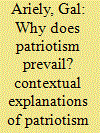

|
|
|
|
|
| Summary/Abstract |
Addressing the normative and empirical debate regarding the nature of patriotism, this paper examines the social contexts in which patriotism – defined here as an expression of national pride – thrives. Combining diverse theoretical explanations, it investigates whether expressions of patriotism are related to globalization, state function, social fractionalization and conflict. A multilevel regression analysis of data from 93 countries led to three principal findings. First, citizens of more developed and globalized countries are less likely to be proud of their country. Second, citizens are more likely to be patriotic in countries characterized by higher levels of income inequality and religiously homogeneity. Third, citizens of countries exposed to direct conflict – that is, suffering terror and causalities from external conflict – tend to exhibit higher levels of national pride. Patriotism frequently being identified as a mandatory political commodity, these results suggest that, overall, patriotism forms part of a less attractive matrix than its advocates tend to assume.
|
|
|
|
|
|
|
|
|
|
|
|
|
|
|
|
|
|
|
|
|